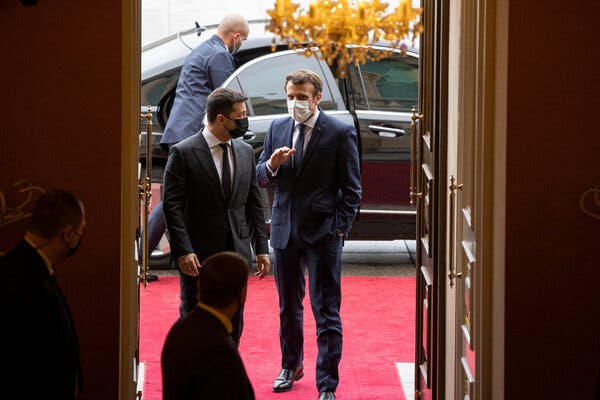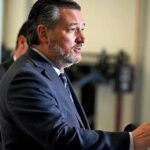
KYIV, Ukraine — The Kremlin on Tuesday rebuffed the idea that President Emmanuel Macron of France and President Vladimir V. Putin of Russia had made meaningful progress toward defusing the Ukraine crisis in their high-stakes meeting in Moscow.
Statements by Russian leaders appeared to undercut French diplomatic authority, and even credibility, just as Mr. Macron arrived in Ukraine to continue his shuttle diplomacy, with 130,000 Russian troops just outside Ukraine and the White House warning that an attack on Ukraine could be imminent.
Even before Mr. Macron’s plane touched down in Kyiv, the Ukrainian capital, Dmitri S. Peskov, the Kremlin spokesman, rejected reports that the two presidents had reached any agreement to de-escalate, suggesting that it was the United States, not France, that had standing to negotiate such a deal.
“In the current situation, Moscow and Paris could not make a deal. France is an E.U. and NATO member,” he said, adding: “France is not leading NATO.”
He also took issue with news reports quoting French officials as saying that Mr. Macron had left Moscow with commitments that Russian troops would not stay in neighboring Belarus after the completion of military exercises this month, and that Russia would not conduct any new military maneuvers near Ukraine in the near future.
The deployment to Belarus was always intended to be temporary, but Russia made no promise about when it would end, Mr. Peskov said. He declined to comment on the report about new maneuvers, but Russia said on Tuesday that elements of its navy had been dispatched to the Black Sea waters near Ukraine.
Mr. Putin and Mr. Macron held a five-hour, one-on-one meeting at the Kremlin on Monday night, and then a joint news conference that went well past midnight. Mr. Putin swung between ominous and something verging on optimistic, keeping his comments vague enough to keep the world guessing.
“A number of his ideas or proposals — which it is probably too early to speak about — I see as rather feasible for creating a foundation for our further steps,” he said of Mr. Macron. But he also warned of war with NATO if Ukraine joins the alliance, and did not rule out an invasion, though the Kremlin has insisted it has no plans for one.
In Kyiv on Tuesday to meet with Ukraine’s president, Volodymyr Zelensky, Mr. Macron said: “You must not underestimate the tension that surrounds the situation that we are living through, its unprecedented nature. I do not believe this crisis can be solved thanks to a few hours of discussions.”
Mr. Peskov said that Mr. Putin was prepared to keep negotiating over Russia’s security demands in Eastern Europe, but added: “So far, we don’t see and feel the readiness of our Western counterparts to take our concerns into account.” The United States and NATO have flatly rejected Russian demands to cease the bloc’s expansion into parts of Eastern Europe that Moscow considers part of its sphere of influence.
Mr. Macron emphasized that addressing Russia’s concerns about NATO and its presence in Eastern Europe was only one half of the diplomatic approach he was pursuing. The other, to address the continuing conflict between Ukraine and Russian-backed separatists in two breakaway eastern Ukrainian provinces through the so-called Normandy Format, showed more signs of promise. Negotiators from France, Germany, Ukraine and Russia are expected to meet again in Berlin this week to continue to work through disagreements around the terms of a 2015 cease-fire.
Mr. Zelensky said that he viewed the upcoming Berlin meeting positively, although he did not yet see an indication that Russia was willing to end its occupation of Crimea, the peninsula that Russia seized in a 2014 invasion, and pull Russian troops from the eastern Ukraine region known as Donbas. Ukraine has said that a Russian withdrawal is a prerequisite for any deal.






